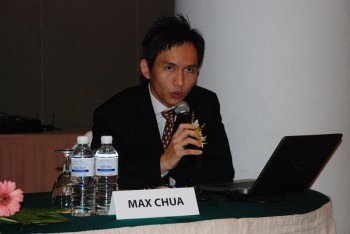Does communist ideology infiltration really exist in modern Malaysia? The answer is “yes” says Max Chua, spokesperson from the local Tuidang movement.
Speaking at a forum on May 22 titled “The Second Malayan Emergency”, Mr Chua said that a resurgence of communist ideology in Malaya is affecting the country’s next generation.
To back up his claims he showed pictures of a Chinese school in Malaysia which has a photo of Karl Marx outside its hall and spoke of how the Chinese Communist Party ‘s (CCP) ‘People’s Daily’ newspapers are distributed in Chinese schools and how bookstores sell communist ideology related books.
Mr Chua explained how currently five communist countries remain in the world: namely Mainland China, Vietnam, Cuba, North Korea, and Laos. Following the fall of Berlin Wall in 1989 and the end of the Soviet Union in August 21, 1991, the biggest communist state to continue is in Mainland China.
“Many people might think that communism is no longer influential [or even] exists today,” said Mr Chua.
“But we are not just talking about the communism’s political ideology and system, we are also talking about its communist culture, mindset, the export of persecutions to other countries, the nature of their belief on struggle and atheism, which is against morality and humanity,” he said.
“How is it going to affect us and our future generations?” he asked.“First of all, we will not be totally independent to exercise our rights based on conscience as the communist influence will surely control the way we think. Moreover, to deal with the communist’s unscrupulous tactics is never the same as facing more reasonable governments [as found in] in democratic and liberal countries.”
1) Gain control on overseas Chinese organizations and media.
2) The use of sexual blackmail on overseas government officials.
3) A spy network.
4) Extend persecution policy on peaceful spiritual groups like Falun Gong, Tibetans and Chinese democracy movements.
To support the above points, Mr Chua spoke of the revelations made by a former high ranking Chinese diplomat Chen Yonglin who defected and sought political asylum in Australia in 2005.
On June 6, 2007, at a press conference in the Canadian Parliament, Mr Chen exposed the CCP’s means of controlling the Chinese diaspora and its overseas media. Mr Chen said an organization in Canada called the National Congress of Chinese Canadians (NCCC), is a covert body for Chinese intelligence activity. Also, he said, most of the Chinese student associations in the universities in Canada, as well as in the US and Australia, were set up by and funded by Chinese diplomatic missions.
Mr Chua described how an Australian Member of Parliament was blackmailed after he was caught having sex with a girl under 16 in China. The Australian politician was immediately detained by Chinese security, recorded and released without any publicity. Later, upon his return to Australia he had become a vocal backer for Beijing in the Australian media.
Mr Chua also showed proof of how the CCP extends it persecution of the Falun Gong spiritual movement into Malaysia. One of the interferences, he said, was the 2008 cancellation of a tour by the Shen Yun Performing Arts Performance group which include in their shows several Chinese dance and music acts depicting the CCP’s repression of Falun Gong. The Chinese embassy pressured the Ministry of Culture, Arts and Heritage of Malaysia to cancel the show permit which was already granted.
One of the forum’s attendee’s Ms Chay said that the Malaysian government has forgotten that Malaysia is an anti-communist country. She said the Malaysian government allows the CCP to establish a regional TV station office and allowed CCP’s propaganda “People’s Daily” to be distributed in Malaysia. “A letter from the CCP embassy is enough to threaten our ministry to cancel a cultural show? It shows that the CCP is using a ‘bilateral-relationship’ as an excuse to interfere with local affairs,” said Ms Chay.
Mr Chua also told the forum that 95 million Chinese people have quit the CCP since 2004 via Tuidang - a volunteer organization that solicits withdrawals from the CCP and its associated organizations, from both Party and non-Party members. On average, about 50,000 people quit the Party on a daily basis he said.








